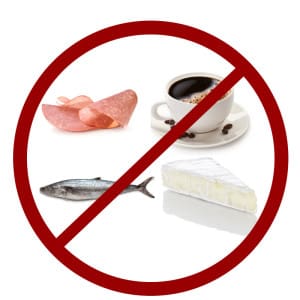
Foods that are too high in mercury or Vitamin A can pose a health hazard to your baby, and also foods that are known to cause food-borne illnesses such as Listeriosis and Salmonella poisoning.
If you’re concerned about what to eat and what to avoid, consult with your healthcare provider. In the meantime, you should definitely avoid eating the following 10 foods which have been proven to be the most dangerous when it comes to pregnancy.
If you don’t cut anything else out of your diet during your pregnancy, make sure you remove the following foods:
- Feta Cheese
This type of cheese has been linked to food-borne illnesses such as Listeriosis. Avoid any cheeses that have “unpasteurized” on the label and choose cheeses like mozzarella cheese instead.
- King Mackerel
The high level of mercury in this particular fish is likely dangerous to your baby. Too much mercury can damage your baby’s nervous system. Make sure that you get the right amount of omega-3 fatty acids by eating healthy, safer types of fish like salmon, tilapia and shrimp.
- Liver
Liver (and liver products like liver pate or liver sausage) have dangerously high amounts of Vitamin A. Too much Vitamin A has been linked to birth defects in babies. Monitor your intake of Vitamin A (ask your healthcare provider how much of this vitamin is safe) and avoid high-dose multi-vitamin supplements, fish liver oil supplements and any supplement containing Vitamin A.
- Caffeinated Drinks
Experts have debated the amount of caffeine a pregnant woman can safely consume. Caffeine can cross the placenta and affect your baby’s heart rate. Common sources of caffeine include coffee, tea and soda. Most doctors recommend that pregnant women drink no more than 200 milligrams of caffeine daily. (An average cup of coffee has about 95 milligrams of caffeine, an 8-ounce cup of tea contains about 47 milligrams and a 12-ounce soda contains about 29 milligrams.) If you’re unsure about how much caffeine is safe, it’s best to avoid it altogether until you talk to your doctor.
- Brie Cheese
Brie cheese is usually unpasteurized and can pose potential health risks to you and your unborn baby. These types of soft cheeses are commonly linked to food borne illnesses such as Listeriosis. Listeriosis can be incredibly dangerous for pregnant women. Even a mild form of this infection can lead to miscarriage, stillbirth or severe illness in newborn babies. Always check the label and avoid any foods that indicate that they are “unpasteurized.”
- Deli Meats
Processed deli meats should be avoided during pregnancy. These meats have been linked to Listeriosis – a dangerous food borne illness. Meats in this grouping include any processed deli meats (ham, turkey, chicken, salami etc) as well as uncooked hot dogs and bologna. Either cook these meats until they are steaming hot – or avoid them altogether.
- Unpasteurized Milk
Like unpasteurized cheeses, unpasteurized milk can cause huge health risks to your unborn baby. Don’t drink raw milk (also known as unpasteurized milk), including sheep’s milk or goat’s milk (that includes goat cheese as well) as these have been known to cause food borne illnesses such as Listeriosis.
- Uncooked Eggs
Some people toss a few uncooked eggs into their smoothies to give a milkshake-like texture, but pregnant woman should avoid uncooked eggs altogether. In their uncooked form, eggs pose a huge risk for salmonella poisoning. Other product made with raw or partially cooked eggs are: some Caesar salad dressings, raw cookie dough and eggnog.
- Swordfish (shark)
Similar to King Mackerel, shark can potentially dangerous levels of mercury for pregnant women. Instead, eat healthier fish like canned light tuna, salmon, shrimp or cod – but make sure you monitor your intake. FDA guidelines state that pregnant women can eat up to 12 ounces (340 grams) of mercury per week, which averages about 2 seafood meals for this time period.
- Blue Cheese
Blue cheese (and other soft cheeses like Camembert and Mexican-style cheeses like queso fresco and queso blanco) can lead to food borne illness. These products are generally made with unpasteurized milk which has often been linked to Listeriosis. Instead, opt for pasteurized cheeses like mozzarella and cottage cheese.
Other foods/drinks that pregnant women should avoid eating that aren’t on the list above include (but aren’t limited to) certain types of sushi (which often contains raw fish), unwashed vegetables, and of course alcohol. Make sure that you continue to consult with your healthcare provider as you have questions during your pregnancy.
